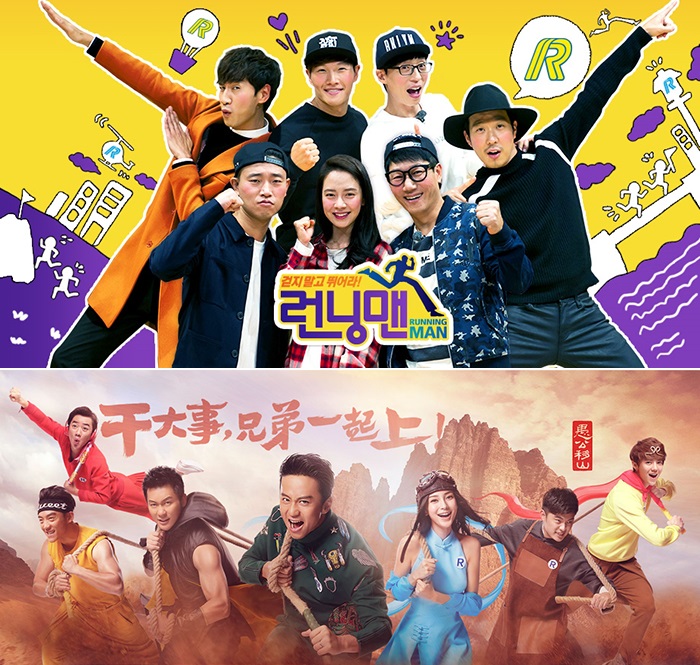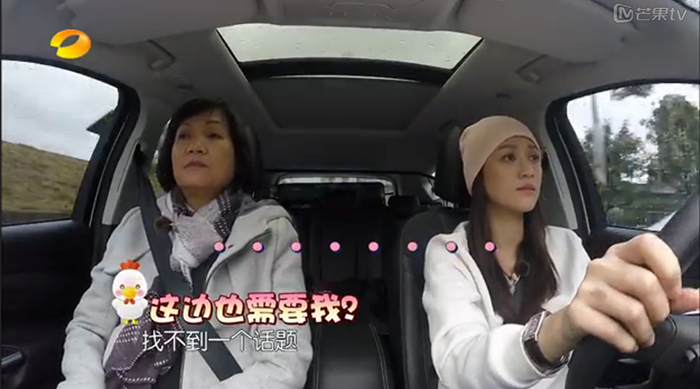
One of Korea's most beloved variety shows, 'Running Man' (top), is the inspiration for Zhejiang Television's 'Hurry Up, Brother!' (bottom). 'Hurry Up, Brother!' was jointly created by Korean and Chinese production teams and is based on the format of 'Running Man.'
The Chinese variety show "Hurry Up, Brother!" ("奔跑吧, 兄弟!") has been rapidly gaining popularity over the past few years. Audiences enjoy watching celebrities, who normally appear perfectly coifed on screen, get ruined and exhausted on the show as they run through the on-camera games.
"Hurry Up, Brother!" first aired in 2014 and recently broadcast the finale of its third season. It's a Chinese version of the Korean variety show called "Running Man" ("런닝맨"). The Chinese offshoot was jointly created by Korean and Chinese production teams, based on the original Korean format. It enjoyed great popularity in its first season and hit 5 percent in the ratings, a very high figure for the mainland Chinese TV industry.
As the above case shows, Korean variety shows are loved by Chinese audiences. The popularity of Korean variety shows, however, is a bit different from the popularity of other Korean TV series and of Korean soap operas in China. In the past, Chinese broadcasters would air Korean TV series made in Korea, starring Korean TV stars. These days, however, they buy the formats of Korean variety shows and remake them as Chinese editions, or even further, work together with Korean production teams to create something entirely new.
"I Am a Singer" ("나는 가수다"), originally made for Korean TV and whose format was sold to Hunan Television in 2012, is broadly accepted as being the first Korean TV show format that was bought by a Chinese broadcaster. Since the Chinese version of the show, "我是歌手" -- also, "I Am a Singer" -- achieved great success, more and more Chinese broadcasters are buying the formats of Korean TV shows. Now, not only TV shows like "Dad! Where Are We Going?" ("아빠 어디가"), "Running Man" ("런닝맨"), "We Got Married" ("우리 결혼했어요") and "Real Men" ("진짜 사나이") are being bought up, which were all aired or which are on the air on public TV channels in Korea. Also, cable TV shows, such as "Grandpas Over Flowers" ("꽃보다 할배") and "Abnormal Summit" ("비정상회담"), have been sold to Chinese production companies and are being made into Mandarin-language TV shows.
In addition to this, Korean production companies are now working on the production of Chinese television programs that are not based on Korean formats. From the early stages of design through to editing, they're working on Chinese TV shows for Chinese audiences. The creator of "I Am a Singer" and an experienced producer, for example, Kim Young-hee, recently made a reality entertainment program called "The Greatest Love" ("旋风孝子") that first aired on Hunan Television on Jan. 23.

Actress Joe Chen (right) and her mother endure an awkward silence during their trip aired on 'The Greatest Love.' The show is a reality program that looks at modern day relationships between parents and adult children.
"The Greatest Love" stars six celebrities, including Hwang Xiaoming, Joe Chen and Zheng Shuang. It shows the celebrities spending time with their real-life parents back in their childhood homes for five nights. The show sprouted from the concept that a child's filial duty and love between parent and child are values shared both by the Chinese and Korean people, the producers said, and that they focus on the universal value of familial love.
One of the Korean producers for "Hurry Up, Brother!" said in an interview about Korea-China joint TV productions that there were some relatively easier aspects, since the two people share a culture and certain sentiments based on their long historical relationship. In short, the producer said, the shared values and the shared culture between the two nations are assets that help the development of Korea-China joint TV productions.
The popularity of Korean variety shows is not guaranteed to continued, or challenges may arise during the joint productions as there may be different practices or misunderstandings between the Korean and Chinese teams. Nonetheless, the fact that producers from the two neighbors are focusing more on universal emotions and sentiments, rather than differences, is noteworthy in itself. And it makes for some great television.
By Chang Iou-chung
Korea.net Staff Writer
Photos: SBS, Zhejiang Television, Hunan Television
icchang@korea.kr